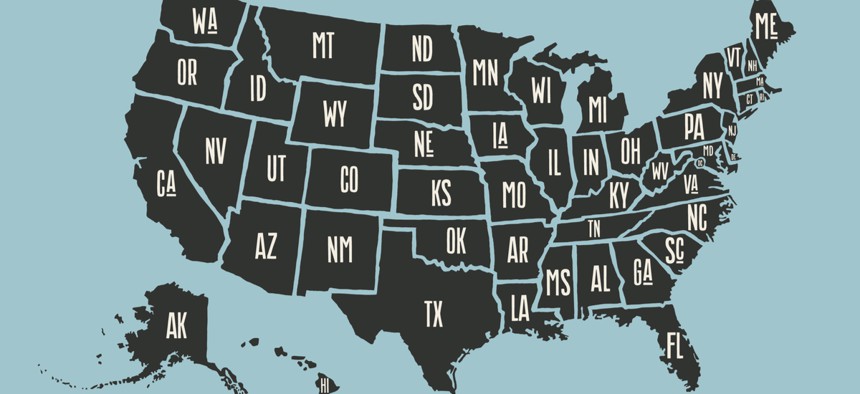Republican Senators Introduce Bill to Relocate Major Federal Agencies Outside of D.C.

Foxys Graphic/Shutterstock.com
Ninety-percent of positions in 10 departments would be moved to economically distressed areas.
Republican senators introduced legislation on Wednesday that would require many large federal agencies to relocate from Washington, D.C., to areas throughout the country with struggling economies.
Sens. Josh Hawley, R-Mo., and Marsha Blackburn, R-Tenn., introduced the “Helping Infrastructure Restore the Economy Act” (S. 2672), which would move 90% of the positions in 10 Cabinet-level departments out of D.C. This includes the agencies’ headquarters and permanent duty stations.
The bill would continue a trend of agencies moving some of their offices outside the Beltway, the senators said. The Agriculture Department is already relocating two research offices to Kansas City, and the Interior Department’s Bureau of Land Management is moving about 250 Washington-based employees out west, including 27 who will serve at the agency’s new headquarters in Grand Junction, Colorado.
“Every year Americans’ hard-earned tax dollars fund federal agencies that are mainly located in the D.C. bubble,” Hawley said in a press release. “That’s a big part of the problem with Washington: they’re too removed from the rest of America. The HIRE Act will move policymakers directly into the communities they serve, creating thousands of jobs for local communities and saving taxpayers billions of dollars along the way.”
If passed, the bill would require the heads of the Office of Management and Budget and General Services Administration to “determine whether the covered agency should be abolished or merged with another executive agency, rather than being relocated.”
If agencies are kept, then the relocation process must begin no more than two years after the 2020 census, the bill states. The executive departments would be moved to economically challenged regions in Missouri, Pennsylvania, Tennessee, Kentucky, Indiana, Ohio, New Mexico, West Virginia, Michigan and South Carolina. “Moving agencies outside of Washington, D.C. both boosts local economies and lowers costs – that’s a winning combination,” said Blackburn. “This legislation would enable Americans across the country to have greater access to good jobs.”
The proposed legislation lays out the penalties for agencies that fail to comply with the relocation within 10 years, including funding cuts and suspending the agency head’s pay.
Hawley said federal jobs are disproportionately concentrated in D.C., but American Federation of Government Employees National President David Cox stated that 85% of federal employees already live outside D.C. The proposed move is “neither cost-effective nor practical” because federal agencies’ headquarters should be “where Congress is best equipped to hold political appointees and agency leaders accountable for their actions,” he said. “Taxpayers would be better served by Congress ensuring federal agencies have the staffing and resources needed to carry out their vital missions.”
Hawley and Blackburn’s legislation reflects what former Rep. Jason Chaffetz, R-Utah, hoped to accomplish in 2017 when he was chairman of the then-House Oversight and Government Reform Committee. Many Republicans, including the president, have championed the idea of “draining the swamp” in D.C.
The bill is also similar, however, to a proposal by Entrepreneur Andrew Yang, a Democratic presidential candidate. His campaign would not comment on the HIRE Act, but directed Government Executive to his website, which says his proposal aims to “provide a boost to local economics and tie the rest of the country to the federal government.”
NEXT STORY: Quick Hits






